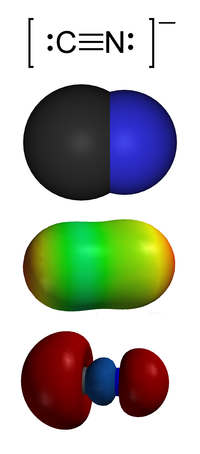
Photo from wikipedia
A large amount of cyanide-containing wastewater is discharged during electrode material synthesis. Among them, cyanides will form metal–cyanide complex ions which possess high stability, making it challenging to separate them… Click to show full abstract
A large amount of cyanide-containing wastewater is discharged during electrode material synthesis. Among them, cyanides will form metal–cyanide complex ions which possess high stability, making it challenging to separate them from these wastewaters. Therefore, it is imperative to understand the complexation mechanism of cyanide ions and heavy metal ions from wastewater in order to obtain a deep insight into the process of cyanide removal. This study employs Density Functional Theory (DFT) calculations to reveal the complexation mechanism of metal–cyanide complex ions formed by the interaction of Cu+ and CN− in copper cyanide systems and its transformation patterns. Quantum chemical calculations show that the precipitation properties of Cu(CN)43− can assist in the removal of CN−. Therefore, transferring other metal–cyanide complex ions to Cu(CN)43− can achieve deep removal. OLI studio 11.0 analyzed the optimal process parameters of Cu(CN)43− under different conditions and determined the optimal process parameters of the removal depth of CN−. This work has the potential to contribute to the future preparation of related materials such as CN− removal adsorbents and catalysts and provide theoretical foundations for the development of more efficient, stable, and environmentally friendly next-generation energy storage electrode materials.
Journal Title: International Journal of Molecular Sciences
Year Published: 2023
Link to full text (if available)
Share on Social Media: Sign Up to like & get
recommendations!